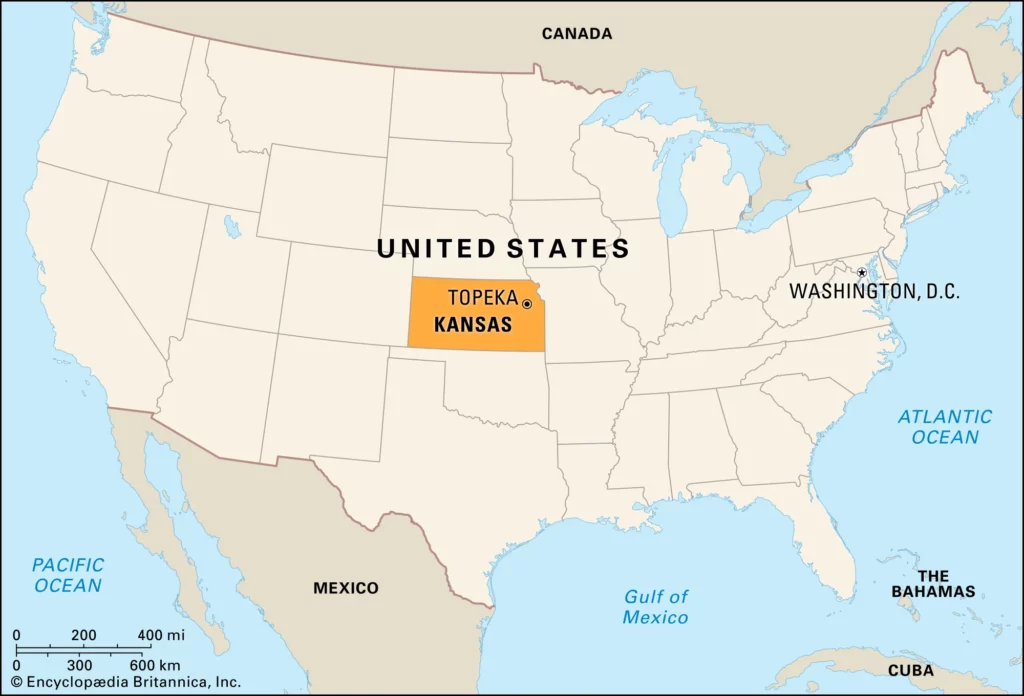
What is a Registered Agent in Kansas?
In Kansas, a Registered Agent serves as the official point of contact for a business entity, including corporations, limited liability companies (LLCs), partnerships, and other legal entities registered with the state. The primary responsibility of a Registered Agent is to receive important legal and tax documents on behalf of the business, such as service of process (lawsuits), government communications, and notifications from the Secretary of State. The role of a Registered Agent ensures that there is a reliable method for the government and other parties to communicate with a business.
Here are some essential aspects of Registered Agents in Kansas:
Who Can Be a Registered Agent: A Registered Agent can be an individual who resides in Kansas or a business entity authorized to conduct business in Kansas. The agent must have a physical address in the state (known as a registered office) and must be available during normal business hours to receive documents.
Legal Requirement: Appointing a Registered Agent is a legal requirement for doing business in Kansas. It ensures that the business can be contacted through a reliable method if necessary.
Privacy and Efficiency: For some businesses, using a professional Registered Agent service (a third-party provider) can help maintain privacy and ensure that important documents are handled efficiently and promptly. This can reduce the risk of missing critical deadlines.
Changing a Registered Agent: If a business decides to change its Registered Agent, it can do so by filing the appropriate forms with the Kansas Secretary of State and paying any required fee.
Public Record: The name and address of a business’s Registered Agent are public record and can be searched through the Secretary of State’s website. This transparency helps maintain trust in the business environment.
How can I determine if my Kansas business needs a Registered Agent?
In Kansas, nearly all formal business entities are required to have a Registered Agent. This requirement exists not just in Kansas, but also in other states within the United States. Here are the factors to consider for determining if your Kansas business needs a Registered Agent:
Type of Business Entity: If your business is registered as a corporation, limited liability company (LLC), limited partnership (LP), limited liability partnership (LLP), or any other formal business entity with the Kansas Secretary of State, you are required to have a Registered Agent.
Doing Business in Kansas: If your business is formed in another state (foreign entity) but operates in Kansas, it is necessary to have a Registered Agent in Kansas. This ensures that your business can receive official government documents and facilitates service of process.
Legal Compliance: The requirement of having a Registered Agent is mandated by Kansas law to ensure that there is a designated point of contact for the government and other parties to communicate with your business. This includes receiving legal notices, tax documents, and compliance-related correspondence.
If your business falls into any of the above-mentioned categories, it is mandatory to designate a Registered Agent in Kansas. The Registered Agent must have a physical address within the state (a P.O. Box is not sufficient) and be available during normal business hours to receive official documents on behalf of the business.
For sole proprietorships and general partnerships that are not formally registered with the state, the requirement for a Registered Agent may not apply in the same manner as it does for formally registered entities. However, if these businesses choose to register with the state or convert to a formal business structure, they would be required to appoint a Registered Agent.
If you are uncertain about the status of your business or whether your business activities necessitate a Registered Agent in Kansas, it is recommended to consult a legal advisor or contact the Kansas Secretary of State’s office for specific guidance tailored to your situation.
What does a Registered Agent do for a Kansas business?

A Registered Agent plays a crucial role for any business entity registered in Kansas. This role encompasses several key responsibilities, including the following:
Service of Process: A Registered Agent receives legal documents on behalf of the business. This includes lawsuits, subpoenas, and other legal proceedings. Ensuring that these documents are received and handled properly is vital for the legal protection of the business.
Governance and Compliance Documents: The Registered Agent is responsible for receiving official state communications. This can include notices from the Kansas Secretary of State, such as compliance requirements and annual report reminders.
Tax Notifications: The Registered Agent may receive tax documents and notifications from state and federal tax authorities on behalf of the business, ensuring that important tax deadlines are not missed.
Acting as a Point of Contact: Having a Registered Agent provides a consistent point of contact for the legal and official correspondence, ensuring that the business does not miss any critical information or deadlines that could impact its operation or legal standing.
Maintaining Privacy: For businesses, especially small businesses and home-based businesses, using a Registered Agent service can help maintain privacy by using the Registered Agent’s address for public records instead of the business owner’s personal address.
It’s important for businesses to choose their Registered Agent carefully, as this role is essential for maintaining the legal compliance and operational integrity of the business. A reliable Registered Agent ensures that the business stays informed and responsive to legal, tax, and compliance matters.
Are there any legal requirements specific to Kansas when selecting a Registered Agent for my business?
Yes, when selecting a Registered Agent for your business in Kansas, there are specific legal requirements that must be met. These requirements are designed to ensure that the state and other parties have a reliable means of communicating with your business. Here are the key legal requirements for a Registered Agent in Kansas:
Physical Presence: The Registered Agent must have a physical street address in Kansas, known as a registered office. Post Office Boxes or mail service addresses are not acceptable for this purpose. This requirement ensures that there is a physical location where legal documents can be served.
Availability: The Registered Agent must be available at the registered office during normal business hours to accept legal documents and official notices on behalf of the business. This ensures timely receipt and response to legal actions or government notifications.
Individual or Entity: The Registered Agent can be an individual (such as the business owner or an employee) who is a resident of Kansas, or it can be a business entity authorized to do business in Kansas. If the agent is a business entity, it must be in good standing with the Kansas Secretary of State.
Consent to Serve: While the state of Kansas does not require Registered Agents to submit a formal consent to the Secretary of State, it is important that the appointed Registered Agent has agreed to serve in this capacity for the business. This ensures that the Registered Agent is willing and prepared to carry out the responsibilities associated with the role.
Listing on Business Formation Documents: When forming your business, you must list your Registered Agent and their address on your business formation documents, such as your Articles of Incorporation or Organization, filed with the Kansas Secretary of State.
Meeting these requirements is crucial for maintaining compliance with Kansas laws and ensures that your business can be reliably contacted for legal and official matters. It’s advisable to review and ensure compliance with these requirements regularly, especially if there are any changes to your business or Registered Agent.
How often should a Kansas business update its Registered Agent information?

In Kansas, there isn’t a set frequency at which a business must update its Registered Agent information. However, it is crucial for a business to update this information any time there are changes to the Registered Agent’s details or if the business changes its Registered Agent. This ensures that the state and any legal entities have the correct contact information for serving legal documents and official communications.
Events that may necessitate an update to your Registered Agent information include:
Change of Address: If your Registered Agent moves to a new physical location or if their office address changes, you must update this information promptly.
Change of Registered Agent: If you decide to change the individual or service acting as your Registered Agent, the Kansas Secretary of State must be informed of this change.
Registered Agent Resignation: If your current Registered Agent resigns, you have a limited time to update your business’s Registered Agent information with a new appointment.
To update the Registered Agent information, you must file the appropriate change form with the Kansas Secretary of State and pay any required fee. These updates can often be completed online through the Secretary of State’s website, or by submitting the form via mail.
Regularly reviewing and, if necessary, updating your Registered Agent information is a good business practice. This not only maintains compliance with Kansas state requirements but also ensures that your business does not miss any important legal notices or other critical communications.
What is the easiest way to get a Registered Agent in Kansas?
Finding a Registered Agent for your Kansas business is a crucial step in ensuring that your business complies with state law and operates smoothly. The easiest and most reliable way to obtain a Registered Agent is using a professional Registered Agent service. One standout option is FormPros’ Registered Agent Service.
Why Choose FormPros for Your Registered Agent Service?
Expertise: FormPros specializes in providing Registered Agent services among other business-related services. Our expertise means we understand the intricacies and requirements for Kansas businesses, ensuring that all legal documents and notifications are handled professionally.
Convenience: With FormPros, you can quickly and easily designate your Registered Agent online, saving you time and the hassle of dealing with paperwork. This convenience allows you to focus more on running your business.
Reliability: A professional service such as FormPros ensures that your business never misses important communications. The Registered Agent you acquire using our service is available during regular business hours to receive any legal documents, lawsuits, or official state communications on your behalf.
Privacy: By using FormPros, your business benefits from an added layer of privacy. Using our service provides you with a Registered Agent, whose public-facing address can help keep your personal or business location private from public records.
Compliance: FormPros will help keep your business in good standing by helping you sign a Registered Agent who will remind you of crucial filing dates like annual reports, ensuring that you comply with Kansas state regulations.
Opting for FormPros’ Registered Agent Service not only simplifies the process of maintaining a Registered Agent in Kansas but also provides peace of mind that your business is in expert hands. Our team makes sure that your legal obligations are met with ease, allowing you to concentrate on expanding your business.
For businesses looking for a hassle-free way to meet state requirements, FormPros offers a straightforward solution with added benefits that go beyond simple compliance. Check out our services today to find the best Registered Agent solution for your Kansas business.
How do I change a Registered Agent in Kansas?

Changing your Registered Agent in Kansas is a straightforward process. Here are the steps you need to follow to update your Registered Agent information:
Obtain the Change of Registered Agent Form: First, you need to obtain the correct form to change your Registered Agent. In Kansas, this is often referred to as the “Change of Registered Office or Resident Agent” form, or a similar name. You can find this form on the Kansas Secretary of State’s website.
Fill Out the Form: Complete the form with the required information. This includes your business entity name, your current Registered Agent information, and the new Registered Agent’s information, including their name and physical address in Kansas.
Obtain Consent from the New Registered Agent: While Kansas law doesn’t specifically require you to submit consent from the new Registered Agent with your form, it is important that your new agent has agreed to take on this responsibility for your business.
Submit the Form and Fee: Once you’ve completed the form, submit it to the Kansas Secretary of State’s office. There may be a filing fee associated with this change, so be sure to check the current fees and include the appropriate payment with your submission.
Confirmation: After your form and fee are processed, the Kansas Secretary of State will update your business’s records to reflect your new Registered Agent. You may receive a confirmation of this change—keep this for your records.
Ensuring that your business details are up-to-date, including your Registered Agent information, is crucial for maintaining compliance with Kansas state law. The process can be done relatively quickly, either by mail or, in many cases, online through the Kansas Secretary of State’s website, which offers an efficient way to manage business filings.
If you find managing updates like these to be cumbersome, consider the services of a professional filing service like FormPros. They can handle these updates and more, ensuring your business stays in compliance without the headache of direct filings.
Can I be my own registered agent in Kansas?
Yes, in Kansas, you can act as your own Registered Agent for your business. Many business owners choose to serve as their own Registered Agent due to the simplicity and cost savings it can offer. However, there are specific requirements that you must meet to serve in this role:
Physical Address: You must have a physical address within Kansas. A P.O. Box or solely an email address is not sufficient, as the address must be a place where legal documents can be physically served.
Availability: You need to be available at the designated address during regular business hours to accept legal documents, notices, and other important communications on behalf of the business.
Becoming your own Registered Agent can be advantageous because it simplifies the process of receiving legal and tax documents. However, there are also considerations to keep in mind:
Privacy: Your address will be listed in public records, which might not be desirable for everyone, especially if you’re running a business from your home.
Travel and Availability: If you frequently travel for business or aren’t consistently available at your registered address during normal business hours, you may miss crucial legal notices or documents.
Professionalism: Having a third-party Registered Agent can enhance the professionalism of your business, especially if you’re operating from home or a non-commercial location.
While serving as your own Registered Agent is perfectly legal and may be practical for some business owners in Kansas, it’s important to weigh these factors carefully. If the responsibilities seem overwhelming or if maintaining privacy is a priority, using a professional Registered Agent service like FormPros could be a valuable alternative. We handle all aspects of Registered Agent acquisition duties, allowing you to focus on growing your business without worrying about missing critical communications.
Is it possible to appoint an out-of-state Registered Agent for your Kansas business?
No, according to Kansas state requirements, your Registered Agent must have a physical street address within the state of Kansas. This rule ensures that there is a reliable in-state location where legal documents, such as service of process, can be physically served on your business. The need for a physical address within Kansas makes it impossible to appoint an out-of-state individual or entity as your Registered Agent for a business operating in Kansas.
However, there are some workarounds if you are based out of state or your ideal Registered Agent is not located within Kansas:
Professional Registered Agent Services: Many businesses opt to use professional Registered Agent services that are authorized to operate in multiple states, including Kansas. These services provide a physical address within Kansas to comply with state requirements, even if the service itself is based out of state.
Designate a Trusted Individual in Kansas: Another option is to designate someone you trust who resides in Kansas and is willing to act as your Registered Agent. This could be a friend, family member, or even an attorney or accountant who agrees to fulfill the role and is regularly available at the given address.
Keep in mind that whoever you choose as your Registered Agent, whether an in-state service or an individual, they must meet Kansas’s criteria by being available at the physical location during regular business hours to receive legal and government documents on behalf of your business.
If you’re considering a professional service, companies like FormPros offer reliable Registered Agent services specifically designed to meet the needs of businesses in Kansas and beyond. Opting for a professional service can provide peace of mind, ensuring that your business remains compliant with state requirements and that all important legal and tax documents are handled appropriately.
Are Registered Agents from Kansas responsible for any fees or taxes?

In Kansas, Registered Agents themselves are not directly responsible for paying any specific fees or taxes simply because they serve as a Registered Agent. Their role is primarily to act as a point of contact between the business entity and the state, ensuring that important legal and tax documents are received and managed properly. However, there are a few related points to keep in mind:
Business Fees and Taxes: While the Registered Agent is responsible for receiving legal and government documents, including notices related to fees or taxes, it is the business entity’s responsibility to pay any fees, taxes, or filings due to the state. This includes annual report fees, franchise taxes, or other state-specific taxes and fees applicable to the business.
Service Fees: If a business uses a professional Registered Agent service, the business will pay service fees to the third-party provider. These fees are for the Registered Agent service and not taxes or state fees. The costs of these services can vary depending on the provider and the level of service offered.
Change of Registered Agent Fee: If a business decides to change its Registered Agent, it must file a form and possibly pay a fee to the Kansas Secretary of State. This fee is related to the administrative cost of processing the change and is not a responsibility of the Registered Agent but rather the business entity making the change.
Therefore, while the Registered Agent plays a crucial role in managing the receipt of legal and tax documents, they do not bear the responsibility for the payment of the business’s fees or taxes to the state. The obligation to ensure that all relevant fees and taxes are paid in a timely manner falls to the business entity itself.
If you’re considering a professional Registered Agent service in Kansas, like FormPros, make sure to account for our service fees in your business planning. While there is a cost involved, the benefits of using a professional service can include ensuring compliance with state requirements, professional handling of official documents, and potentially more time to focus on other aspects of your business.
Sign Up for a Registered Agent in Kansas Now
State Specific Registered Agent Service
- Alabama
- Alaska
- Arizona
- Arkansas
- California
- Colorado
- Connecticut
- Delaware
- Florida
- Georgia
- Hawaii
- Idaho
- Illinois
- Indiana
- Iowa
- Kansas
- Kentucky
- Louisiana
- Maine
- Maryland
- Massachusetts
- Michigan
- Minnesota
- Mississippi
- Missouri
- Montana
- Nebraska
- Nevada
- New Hampshire
- New Jersey
- New Mexico
- New York
- North Carolina
- North Dakota
- Ohio
- Oklahoma
- Oregon
- Pennsylvania
- Rhode Island
- South Carolina
- South Dakota
- Tennessee
- Texas
- Utah
- Vermont
- Virginia
- Washington
- West Virginia
- Wisconsin
- Wyoming
Kansas Registered Agent FAQs
-
What is a Registered Office in Kansas?
The registered office is the physical street address in Kansas where the Registered Agent is available to receive legal and official documents on behalf of the business. It must be a physical location, not a PO Box.
-
Can a Kansas business change its Registered Agent at any time?
Yes, a Kansas business can change its Registered Agent at any time by filing the appropriate forms with the Kansas Secretary of State and paying any applicable fee.
-
Is having a Registered Agent in Kansas mandatory?
Yes, having a Registered Agent in Kansas is legally required for all formal business entities registered in the state.
-
Can a business act as its own Registered Agent in Kansas?
No, a business entity cannot serve as its own Registered Agent. However, an owner or an employee of the business can serve as the Registered Agent, provided they meet the state's requirements.
-
Are there any risks associated with being a Registered Agent in Kansas?
The primary risk is failing to handle or forward important documents correctly, which could result in legal or financial consequences for the business. Privacy could also be a concern, as the Registered Agent's address is public record.
-
Do Registered Agents in Kansas need to keep records for the businesses they represent?
While Kansas law does not explicitly require Registered Agents to keep records, it's a good practice for Registered Agents to maintain accurate records of all documents received and forwarded to ensure compliance and accountability.
-
What happens if a Registered Agent in Kansas is not available when documents are served?
If a Registered Agent is not available, this could delay the business receiving crucial legal documents, potentially leading to missed deadlines or default judgments in legal actions.
-
Can a non-resident be a Registered Agent in Kansas?
A non-resident can be a Registered Agent in Kansas only if they are part of a Registered Agent service that is authorized to do business in Kansas and has a physical address within the state.
-
How do public records in Kansas display Registered Agent information?
Registered Agent information, including name and registered office address, is publicly available through the Kansas Secretary of State’s website, accessible by anyone performing a business entity search.
-
Is a Registered Agent notified if a lawsuit is filed against the business they represent in Kansas?
Yes, part of a Registered Agent's role is to receive the service of process (legal notification of a lawsuit) on behalf of the business, and they must then forward this information to the business as soon as possible.
-
How do professional Registered Agent services in Kansas protect a business's privacy?
Professional Registered Agent services use their own address as the public record, which can help protect the business owner's personal address and privacy, especially for home-based businesses.
-
Can the Registered Office be a home address in Kansas?
Yes, the Registered Office can be a home address, as long as it meets the requirement of being a physical address where the Registered Agent can receive documents.
-
What are the consequences of not maintaining a Registered Agent in Kansas?
Not maintaining a Registered Agent can lead to a business being in bad standing with the state, which can result in administrative dissolution, penalties, and the loss of the ability to legally operate within the state.
-
Can a business have multiple Registered Agents in Kansas?
No, a business can designate only one Registered Agent who has a single registered office address in Kansas.
 Rated 4.8 from 14,000+ Happy Customers
Rated 4.8 from 14,000+ Happy Customers

